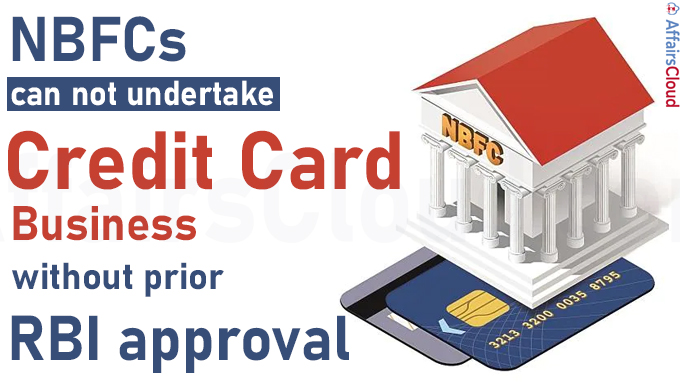
The Reserve Bank of India (RBI) in exercise of the powers conferred by Sections 35A and Section 56 of the Banking Regulation Act, 1949 and Chapter IIIB of the RBI Act, 1934, has issued RBI (Credit Card and Debit Card – Issuance and Conduct) Directions, 2022 w.e.f. July 01, 2022.
- These will be applicable to all Scheduled Commercial Banks-SCBs (excluding Payments Banks, State Co-operative Banks and District Central Co-operative Banks) and all Non-Banking Financial Companies (NBFCs) operating in India.
Key Highlight: NBFCs can’t undertake Credit Card Business without RBI’s prior approval
As per the directions, NBFCs can not undertake credit card business without the prior approval from apex bank.
- If any company including a non-deposit taking company intending to engage in this activity will require a Certificate of Registration (CoR), a pre-requisite for which is a minimum net owned fund of Rs 100 crore.
- Overall NBFCs need RBI approval to issue debit cards, credit cards, charge cards, or similar products virtually or physically.
Point to be noted:
Until now, RBI has allowed only two public sector NBFCs to issue credit cards – SBI (State Bank of India) Cards; and BoB (Bank of Baroda) Cards.
Directions for SCBs:
SCBs, other than regional rural banks (RRBs), with a net worth of Rs 100 crore and above can do credit card business either independently or in tie-up arrangement with other card-issuing banks or NBFCs with their board approvals.
- However, SCBs, excluding Small Finance Banks (SFBs) and regional rural banks, who want to set up separate subsidiaries for credit card business will need the RBI nod.
- For co-branded cards, the role of the co-branding partner entity will be limited to marketing and distribution of the cards. The Co-branding partner will not have access to information relating to transactions undertaken through the card.
Rules to issue Debit Cards
i.Prior approval from the RBI is not necessary for banks to issue debit cards.
ii.Banks will formulate a comprehensive debit cards issuance policy, with its board approval.
iii.Debit cards will only be issued to customers having savings bank/current accounts.
iv.These cards can’t be issued to cash credit or loan account holders. However, banks can link the overdraft (OD) facility provided along with Pradhan Mantri Jan Dhan Yojana (PMJDY) accounts with a debit card.
Others:
i.RRBs can issue credit cards but with their sponsor bank or other banks.
ii.Financially sound and well managed CBS-enabled Scheduled Urban Cooperative Banks (UCBs), with a minimum of Rs 100 crore net worth, can issue credit cards under certain conditions.
iii.Issue of unsolicited credit cards, or unsolicited upgrading of cards is strictly prohibited.
iv.For instructions on the interest rate, card-issuers will be guided by the RBI from time to time.
- Card-issuers will also prescribe an interest rate ceiling.
- In the case of card issuers charging interest rates, which vary based on the payment or default history of the cardholder, there should be transparency in levying such differential interest rates.
v.UCBs are permitted to issue credit cards to their regular members and nominal members only, but not to non-members. Further, UCBs are not allowed to issue co-branded credit cards.
- The total unsecured loans and advances (with surety or without surety or cheque purchases) granted by a UCB to its members together with cumulative approved credit card limits shall not exceed 10 percent of its total assets as per audited balance sheet as on March 31st of the preceding financial year, as prescribed under exposure norms.
RBI also issued guidelines on Types of credit cards, Closure of Credit Card, Billing, among others. Click Here for Official Notification
RBI launches 98th Quarterly Industrial Outlook Survey 2022 to Assess Business Sentiment
RBI has launched 98th round of the quarterly Industrial Outlook Survey (IOS) 2022 of India’s manufacturing sector for the reference period April-June 2022. The survey assesses business sentiment for the Q1FY23 and expectations for the ensuing Q2FY23 period.
- It is based on qualitative responses on a set of indicators pertaining to demand conditions, financial conditions, employment conditions and the price situation.
- Genesis Management & Market Research Pvt Ltd has been authorized to conduct the survey for April-June 2022 on behalf of RBI.
Key Points:
i.The survey provides useful insight into the performance of the manufacturing sector.
ii.Amid uncertainties of COVID-19 pandemic, an additional block has been included in this survey round for assessing the outlook on key parameters for the two subsequent quarters (Q3:2022-23 and Q4:2022-23),
RBI launched 33rd Quarterly Services and Infrastructure Outlook Survey 2022
RBI also launched the 33rd round of the quarterly Services and Infrastructure Outlook Survey (SIOS) 2022.This also launched for the reference period April-June 2022. The survey assesses the business situation for the current quarter(Q1:2022-23) from selected companies in the services and infrastructure sectors and their expectations for the ensuing quarter (Q1:2022-23).
- This survey captures responses on a set of indicators pertaining to demand conditions, financial conditions, employment, and the price situation.
- It will also be conducted by Genesis Management & Market Research Pvt Ltd.
Recent Related News:
i.RBI has proposed to assess the impact of its multi-media awareness campaigns that promote financial literacy and safe banking practices. In this regard, it has invited the Request for Proposal (RFP) from certain shortlisted entities, which will be required to undertake outcome and impact assessment of its multilingual, pan-India public awareness campaigns.
ii.RBI cautioned public against car pooling app sRide, which is operating a semi-closed pre-paid instrument without authorization from the central bank under the provisions of the Payment and Settlement Systems Act, 2007.
About Reserve Bank of India (RBI):
Establishment– April 1, 1935
Headquarters– Mumbai, Maharashtra
Governor– Shaktikanta Das
Deputy Governors– Mahesh Kumar Jain, Michael Debabrata Patra, M. Rajeshwar Rao, T. Rabi Sankar




